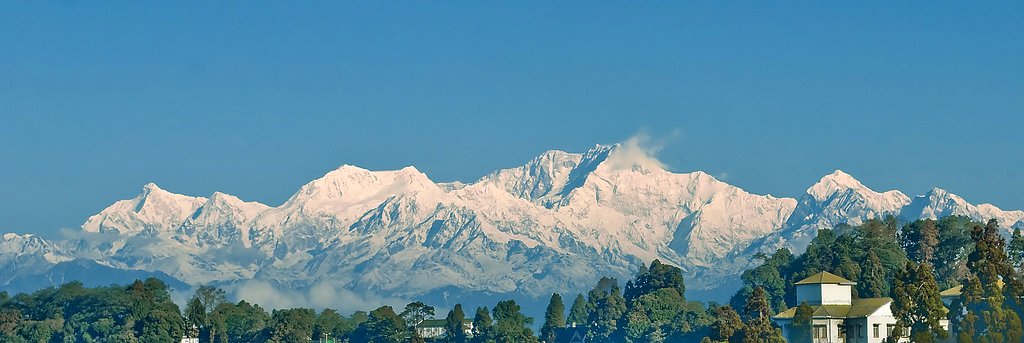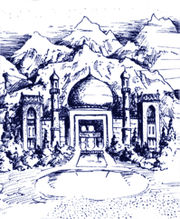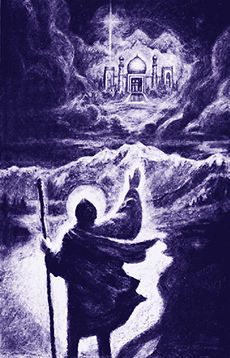Temple of Good Will: Difference between revisions
m (→Description) |
(Added 2 pictures of the retreat) |
||
| Line 6: | Line 6: | ||
== Description == | == Description == | ||
[[File:106138J-rev.jpg|thumb|upright=0.6|link=|A drawing of the retreat at Darjeeling made under Mark Prophet’s direction]] | |||
The etheric retreat is a glistening white building in Moorish architecture, square with minarets at the four corners and a large central flame-shaped dome. The walls are as thick as a medieval castle. The apertures are also flame or dome-shaped, delicately shaded in a pale blue as are the doorways, the apertures atop the minarets, and the carvings that mark the divisions of the four stories of the retreat. | The etheric retreat is a glistening white building in Moorish architecture, square with minarets at the four corners and a large central flame-shaped dome. The walls are as thick as a medieval castle. The apertures are also flame or dome-shaped, delicately shaded in a pale blue as are the doorways, the apertures atop the minarets, and the carvings that mark the divisions of the four stories of the retreat. | ||
| Line 30: | Line 32: | ||
== The sternness of Morya == | == The sternness of Morya == | ||
[[File:100259J-rev.jpg|thumb|upright|link=|alt=A chela walking on a path, the Darjeeling Retreat appearing in the clouds ahead of him]] | |||
There are great lessons to be learned on the path of initiation, and they begin even at the very door of Morya’s retreat in Darjeeling. Morya is a very stern guru, and he has an interesting sense of humor. At the entrance to this retreat, he keeps a very gruff chela. This gatekeeper has no appearance whatsoever of mastery or of even being worthy to stand at the gate of the master’s retreat. He speaks gruffly and is not dressed in the best of attire. If those who knock at the door of the retreat have disdain for the gatekeeper, then the master determines that they are not worthy to be received at his retreat. | There are great lessons to be learned on the path of initiation, and they begin even at the very door of Morya’s retreat in Darjeeling. Morya is a very stern guru, and he has an interesting sense of humor. At the entrance to this retreat, he keeps a very gruff chela. This gatekeeper has no appearance whatsoever of mastery or of even being worthy to stand at the gate of the master’s retreat. He speaks gruffly and is not dressed in the best of attire. If those who knock at the door of the retreat have disdain for the gatekeeper, then the master determines that they are not worthy to be received at his retreat. | ||
Revision as of 17:26, 16 June 2016

The Temple of Good Will is the etheric retreat of the master El Morya. It is located in the etheric realm in the foothills of the Himalayas above the city of Darjeeling, India. Magnificent, radiant currents of light pour from his retreat, which also has a physical focus in the hills surrounding the city.
Description

The etheric retreat is a glistening white building in Moorish architecture, square with minarets at the four corners and a large central flame-shaped dome. The walls are as thick as a medieval castle. The apertures are also flame or dome-shaped, delicately shaded in a pale blue as are the doorways, the apertures atop the minarets, and the carvings that mark the divisions of the four stories of the retreat.
As we enter this headquarters of the inner-world government, on the first floor, we are shown the main auditorium. At the far end is the focus of the diamond heart, ministered unto by the devas and Brothers of the Diamond Heart. On a raised altar there is a pale-blue diamond with a delicate blue flame encompassing the white flame that is visible in the center of the diamond.
The Brothers of the Diamond Heart who serve at this retreat under the master El Morya assist humanity’s endeavors by organizing, developing, directing and implementing the will of God as the foundation for all successful organized movements. Within this main auditorium and the adjoining council rooms, the brothers, in their royal-blue robes of oriental design finished with light blue sashes, meet to discuss the plans of the Brotherhood for the most effective release of the flame of the will of God into the arena of action. Their great love for the will of God emanates the feeling of great compassion for humanity and of concern for their welfare, that they go not astray as they attempt in good faith to carry out the vows they have made at inner levels to further the divine plan and the onward-moving tide of the Father’s will for the coming golden age.
The diamond-shining mind of God is the focus, the very heart, of any endeavor. Thus, these servants of the will of God, through their devotion to the diamond in the Great Hub and its focus here on the altar at Darjeeling, assist the Holy Christ Selves of any group who come together for service in maintaining a focus of that diamond as a magnet that will draw to the group the energies required for the completion of a particular project or community service. These brothers direct the angel ministrants of the flame, the devas and the angels of white fire and blue lightning to go forth with the creative essence of the sacred fire focused here to carry it daily to the many centers of action across the face of the earth.
In rooms adjoining the main auditorium, public servants, world and community leaders and holders of public office are schooled between embodiments and in their finer bodies during sleep. All lifestreams on the first ray come here at one point or another in their embodiments, as well as between embodiments, to renew the charge of Morya’s thrust for a purpose in the world of form and to refresh their own understanding of the intricacies of the will of God in politics, in religion, in business, in finance and in education.
Second floor
On the second floor we are shown the private quarters of our beloved master, his study, libraries and formal meeting rooms for members of the Darjeeling Council. Another great hall is fully equipped to accommodate several hundred ascended and unascended masters who meet frequently to discuss international problems and the means to their solution.
Third floor
We are taken to the third floor where we notice more of the intricate carvings in Indian and Tibetan designs engraved in the white marble. The theme of the blue lotus recurs throughout the halls, whereas in the interior of the master’s quarters we see his favorite flower, the forget-me-not, clustered here and there. We learn that these carvings can be changed at will, for they are engravings of the diamond-shining mind of God, which the brothers of this retreat reflect to a remarkable degree and use as a function of the Christ mind and its ability to precipitate and to heal at will.
As we approach this floor, our hearts are expectant and quickened by the pulsations of the focus of the will of God. The doors to the flame room are opened by our host who bids us enter. Sparkling white walls are contrasted by royal-blue floor and ceiling. The flame of the will of God is adorned in the center of the room by an inlaid design, a cosmic pattern in mosaic, a focus of the divine geometry. The flame has a royal-blue center with deeper and lighter shades flowing without as facets of the will of God.
The third and fourth floors of the retreat have many prayer and meditation rooms. Here, worship is conducted, and special ceremonies are even held upon the roof under the stars where there is also an astronomical observatory.
The sternness of Morya

There are great lessons to be learned on the path of initiation, and they begin even at the very door of Morya’s retreat in Darjeeling. Morya is a very stern guru, and he has an interesting sense of humor. At the entrance to this retreat, he keeps a very gruff chela. This gatekeeper has no appearance whatsoever of mastery or of even being worthy to stand at the gate of the master’s retreat. He speaks gruffly and is not dressed in the best of attire. If those who knock at the door of the retreat have disdain for the gatekeeper, then the master determines that they are not worthy to be received at his retreat.
The master himself addresses the subject of his seeming sternness and of his great love for us:
- For a long period of time individuals have intimated to mankind that I, Morya El, am extremely stern. This may be true, in a sense, that I am stern because the first ray in itself represents the will of God. And I ask you, beloved hearts, if I, as the chohan of the first ray, am to flinch from the will of God, then where is the foundation and basis for all that is to follow?
- But I tell you that my love is as real and tangible as any of the other chohans of the rays, and they will be the first to witness to its reality and tangibility. If you contact any other master of light, whether you are sleeping or awake in your finer bodies, they will verify the great love. But I know, my chelas, it is not necessary that you ask, for you know, who know the light, that I love you. You know that I have stood beside you when you needed me. And you know that I will continue to do so as long as you revere in your hearts and minds the will of God, even when sometimes you seem to fall short of it.
- However, I do not condone falling short of the will of God. I hope that the day will soon come when every one of you will be so firm that nothing can break you or shake you or change you. I await that day. I await the day when you are ready to give your all to the light as we have done.[1]
Welcome to Darjeeling
Morya opens his doors constantly to different lifestreams who desire to come closer to the will of God. He invites you to his retreat where he and the Brothers of the Diamond Heart open their arms and say, “Come to our fireside, warm yourselves upon the sacred fires, partake of our holy communion.”
Morya says:
- Gracious ones, as I gaze upon the minarets here at Darjeeling, as I see the gleaming white marble so unlike and yet like the Taj Mahal, as I see our art treasures resplendent in hope of the will of God, how I would share with you some glimpse of all that herein remains as a monumental achievement to the Temple of Good Will. How I would share with you the soft carpets of our retreat. How I would share with you the musical tinkle of our fountain. How I would share with you the pleasant hours by the fireside, contemplating the immortal purpose.
- How I would share with you myself and all that God has wrought through me. How I would share with you the love of the shining faces round about our council table. How I would share with you the deliberations of our council. How I would share with you the communion of saints and the communion with heaven. How I would share with you the mighty pillar of good will, the great blue flame that pulsates upon our altar. How I would share with you every gift of good will, this season and eternally.[2]
Sources
Mark L. Prophet and Elizabeth Clare Prophet, The Masters and Their Retreats, s.v. “Temple of Good Will.”
- ↑ Mark L. Prophet and Elizabeth Clare Prophet, MORYA: The Darjeeling Master Speaks to His Chelas on the Quest for the Holy Grail (1983), p. 56.
- ↑ El Morya, “The Jar of Freedom,” December 12, 1965, in Mark L. Prophet and Elizabeth Clare Prophet, Morya: The Darjeeling Master Speaks to His Chelas on the Quest for the Holy Grail (1983), p. 334.
